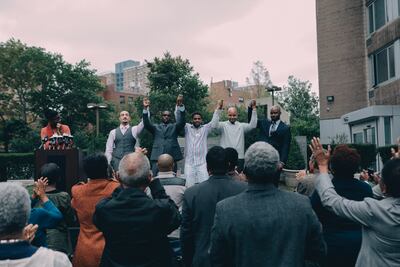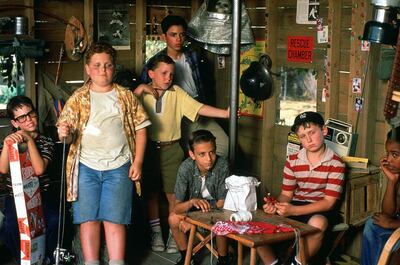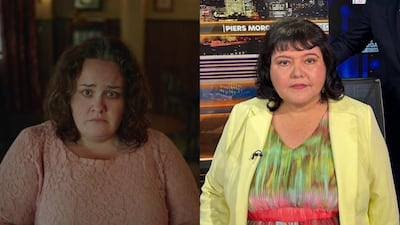Fiona Harvey, the Scottish lawyer who claims the character of Martha in Netflix’s global hit Baby Reindeer was based on her, is taking the streaming giant to court and seeking damages of at least $170 million.
Baby Reindeer is one of this year’s most popular shows on Netflix.
It has gained worldwide attention for its portrayal of events based on Scottish writer, actor and comedian Richard Gadd's personal experience with a stalker.
The show and Harvey have been a source of constant intrigue and speculation.
Not only has the plot captivated audiences but, as discussed on The National’s podcast Culture Bites, the way fans have reacted to the show brings up questions such as where the line should be drawn for anonymity and the right to privacy.
And, how should people react when a "version" of their truth is turned into a form of content for consumption?
Whether accurately portrayed on the show or not, Harvey isn’t the first private citizen to go to court over how they were depicted on the screen.
She joins others who have taken legal action against networks and studios over how their alleged characters and stories were reframed for entertainment purposes.
Here is a look at hers and other cases:
Baby Reindeer

Harvey is accusing Netflix of defamation, intentional infliction, emotional distress, negligence and breach of her right to publicity because of how the character of Martha, who is allegedly based on her, was portrayed in the show.
“The lies that Defendants told about Harvey to over 50 million people worldwide include that Harvey is a twice-convicted stalker who was sentenced to five years in prison, and that Harvey sexually assaulted Gadd,” her complaint says.
“Defendants told these lies, and never stopped, because it was a better story than the truth, and better stories made money.”
The lawsuit says that, as a result of the show, “Harvey’s life had been ruined. Simply, Netflix and Gadd destroyed her reputation, her character and her life.”
Netflix has vowed to fight against the lawsuit.
“We intend to defend this matter vigorously and to stand by Richard Gadd’s right to tell his story,” a Netflix representative said.
Inspired by Gadd's experience, the miniseries tells the story of Donny Dunn, a struggling comedian and barkeeper, who is stalked by a mentally unstable woman.
Gadd's story began as a one-man Edinburgh Festival play, before it was picked up by Netflix and he was given the lead role.
Martha, the character allegedly based on Harvey, is played by actress Jessica Gunning.
Baby Reindeer has garnered more than 50 million views since its release on Netflix in April this year, according to the streamer.
While Gadd has said in many interviews that he changed identifying details about his characters, online users were able to find and identify Harvey as the alleged real-life Martha. The internet’s search for the inspiration for Martha also prompted Gadd to release a statement on his Instagram account.
“People I love, have worked with, and admire (including Sean Foley) are unfairly getting caught up in speculation,” he said on Instagram Stories.
“Please don’t speculate on who any of the real life people could be. That’s not the point of our show.”
However, after Harvey’s identity was supposedly revealed, she made an appearance on Piers Morgan’s YouTube show denying many aspects of Gadd and Netflix's portrayal of her alleged character and actions on the show.
When They See Us

In March of 2020, Linda Fairstein, the former Manhattan sex crimes prosecutor, sued Netflix and director Ava DuVernay over how she was portrayed in the series When They See Us.
The 2019 mini series was a dramatisation of the real-life 1989 Central Park Five case.
It explores the story of five teenage boys of colour, who were wrongfully accused and convicted of raping a white woman in New York's Central Park.
The boys who were aged 14-16 at the time were coerced into false confessions by the police and prosecutors, including Fairstein, who was head of the Manhattan District Attorney's Sex Crimes Unit at the time.
In her lawsuit, Fairstein claimed that the way the series depicted her character amounted to defamation, as she was shown as a "racist, unethical villain."
Her complaint went on to say that the responsibilities and viewpoints attributed to her were not hers, and that the show falsely portrayed her as being responsible for the investigation and prosecution of the Central Park Five case.
In June 2024, a settlement was reached between Netflix and Fairstein.
While Fairstein didn’t receive any money, the streaming platform agreed to donate $1 million to the Innocence Project and to add a disclaimer at the start of the show that read:
“While the motion picture is inspired by actual events and persons, certain characters, incidents, locations, dialogue, and names are fictionalised for the purposes of dramatisation.”
Straight Outta Compton

Jerry Heller was a music manager and businessman, who was an important figure in the emergence of the West Coast rap music scene. He is mostly known for discovering and managing acts such as N.W.A, who are considered one of the earliest and most significant figures of the gangster rap subgenre.
In 2015, Heller sued Universal Pictures over the depiction of his character in the film Straight Outta Compton.
The biographical drama is the story of the the rise and eventual fall of N.W.A following the lives of group's members, Eazy-E, Ice Cube, Dr Dre, MC Ren, and DJ Yella as they navigate the music industry and their personal conflicts.
Heller alleged that the film was full of factual inaccuracies and portrayed him as a “sleazy manager" who chose to take advantage of the group by making them sign unfavourable contracts. He also claimed that the film took content from his own screenplays and book.
Heller died in 2016 and the lawsuit was dismissed by a California judge in 2019, citing a lack of evidence and proof from Heller's estate.
The Sandlot

The 1993 coming-of-age sports comedy, The Sandlot is an enduringly popular film about a group of young boys bonding over their love for baseball in the summer of 1962.
Exploring themes of friendship and childhood, the film is not officially based on a true story but was deeply influenced by the childhood of the writer David Mickey Evans.
In 1997 Michael Polydoros, a private citizen who was the alleged inspiration of one of the characters in the film, Michael "Squints" Palledorous, sued Twentieth Century Fox, the makers and producers of The Sandlot.
Polydoros claimed that the film appropriated his name and likeness and invaded his privacy by doing so. He also alleged that the nickname of the character based on him "Squints" used in the film was derogatory, based on his thick glasses, and that people were now teasing him in real life because of it.
In that same year, Polydoros lost with the court ruling in favour of the filmmakers. They concluded that The Sandlot was a work of fiction and that the film didn’t invade Polydoros' privacy.


